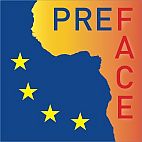WP3: Heat and freshwater budgets, air-sea interaction
Lead: Bernard Bourlès (IRD), Marcus Dengler (GEOMAR)
Main Objective:
WP 3 focuses on improving the understanding of the physical processes controlling the mixed layer heat and freshwater balances in the eastern boundary upwelling regions and in the Gulf of Guinea. Heat and freshwater budgets in coastal upwelling regions and surrounding areas will be estimated, as they are important to validate high-resolution ocean and coupled models.
Specific Objectives:
- To determine seasonal and interannual variability of the mixed layer heat and fresh water budgets by quantifying air-sea fluxes and diapycnal, isopycnal and advective heat and freshwater fluxes in the eastern boundary upwelling systems and the Gulf of Guinea.
- To investigate local air-sea interaction and ocean feed-backs in frontal regions and the impact of short period wind fluctuations on Bjerknes and wind-evaporation-SST feedbacks controlling interannual and longer time scales.
- To analyse the impact of near-inertial oscillations on mixed layer depth and their contributions to the mixed layer heat budget.
Explore our output section for more.
Partners involved:
- UCPH, Denmark
- IRD, France
- MF-CNRM, France
- UPMC, France
- GEOMAR, Germany
- IOW, Germany
- IMR, Norway
- INIP, Angola
WP4: Circulation and wave response
Lead: Peter Brandt (GEOMAR, Germany), Mathieu Rouault (UCT, South Africa)
Main Objective:
The main objective of WP4 is to improve our understanding of the role of local and remote forcings such as circulation variability or wave propagation along the equatorial and coastal wave-guide in setting mean SST pattern and in driving SST variability in eastern boundary coastal upwelling regions of both hemispheres. This WP is based mainly on observations performed partly together with WP3 and build on interaction with the synthesis WP5 that mainly focus on ocean modeling.
Specific Objectives:
- Extend the existing observational network by installing new time series stations to allow evaluation of changes in the advection of anomalous water masses and wave propagation along the equatorial and coastal wave guides.
- Using historical and new observational data to characterise the local circulation system near the coastal upwelling regions including the Gabon and Angola Currents, the upwelling undercurrents, and the Angola Dome.
- Identify and understand differences in the connection of coastal upwelling systems of both hemispheres with the equatorial region.
- Understand the generation and evolution of warm and cold events in the coastal upwelling regions of both hemispheres.
Explore our output section for more.
Partners involved:
- UiB, Norway
- IRD, France
- GEOMAR, Germany
- IOW, Germany
- IMR, Norway
- INIP, Angola
- MFMR, Namibia
- UCT, South Africa
- UCAD, Senegal
WP5: Joint observations – model comparison
Gael Alory (IRD, France), Alban Lazar (UPMC, France)
Main Objective:
WP5 aims to evaluate to what degree forced medium to very-high-resolution ocean models are able to reproduce observed mean state and variability in the eastern tropical Atlantic Ocean, to identify causes of failure and ways of improvement and to produce control experiments to help interpret observations. Main ocean properties targeted are heat and freshwater budgets, velocity or transport time series, signal propagation along the equatorial and coastal waveguide and horizontal and vertical gradients within the upper ocean.
Specific Objectives:
- Produce and validate an ensemble of reference forced simulations from various models and configurations, from regional, to basin scale and global.
- Conduct numerical experiments to test the sensitivity to model configurations, and to propose OGCM improvements to better simulate tropical Atlantic variability.
- Conduct numerical experiments to test the sensitivity to model configurations, and to propose OGCM improvements to better simulate tropical Atlantic variability.
Explore our output section for more.
Partners involved:
- UCPH, Denmark
- IRD, France
- UPMC, France
- GEOMAR, Germany
- IOW, Germany
- UCT, South Africa
- UCAD, Senegal
- UAC, Benin
- CRO, Ivory Coast
